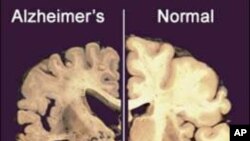Simply taking a daily vitamin D supplement may be enough to ward off Alzheimer’s disease and other forms of dementia, according to medical experts.
Researchers caution, however, that the results of a large, recently published study do not demonstrate that low levels of vitamin D necessarily cause dementia. Still, they are encouraged by the link between the affliction and vitamin D deficiency.
An estimated 50 percent of older individuals have low levels of the nutrient, according to the study, published in the journal Neurology.
If there is, in fact, a connection between depleted vitamin D levels and dementia, including Alzheimer’s, it may be possible to prevent or even treat the brain disorders with a simple supplement.
“It’s an open question whether you could reverse the impact on peoples’ memory and other aspects of their ability to think clearly. What we’re hoping is, obviously, that we can at least slow down the accumulation of disease in the brain. Or if we could stabilize things, that would be great,” said David Llewellyn, a clinical epidemiologist with Britain’s University of Exeter Medical School.
He is co-author of a study involving just over 1,600 elderly American adults over the age of 65.
Participants in the six-year study were dementia-free when researchers measured their vitamin D levels. After a half dozen years, 171 of the adults developed dementia and 102 had clinical signs of Alzheimer’s disease.
Investigators found that low levels of vitamin D increased the risk of dementia by 53 percent. Those with severe deficiency had a 125 percent increased risk of dementia compared to those with normal vitamin D levels.
In addition, people who were deficient in vitamin D were 70 percent more likely to develop Alzheimer’s disease. Those who had severe deficiency were 120 percent more likely to develop Alzheimer's, compared with people whose vitamin D levels were adequate.
“We were surprised by this because the association was about twice as strong as we predicted from our previous research. So the risk of dementia was more than doubled in those who had the lowest levels of vitamin D,” Llewellyn said.
Other studies have linked vitamin D deficiency to stroke, autoimmune disease and the health of nerve cells.
The best sources of vitamin D are exposure to sunlight and a diet rich in oily fish, like salmon. Llewellyn says people in northern climates tend to be at higher risk of deficiency. But there’s a fair amount of vitamin D deficiency in countries where people cover up to avoid over-exposure to the sun and skin cancer.
There may be a vicious cycle among people who develop dementia. Their vitamin D levels can become even more depleted as they tend to eat poorly and become less physically active, according to Llewellyn.




